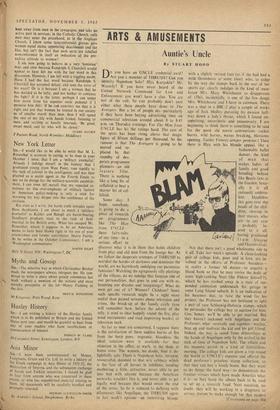The Sex War SIR, - - -if S. R. Rahman feels I have
offered an insult to his religion during the course of the corre- spondence on the sex war, I must assure him I meant no such thing. 1 based my reference to Islam on a fact remembered from classes on comparative theology I attended during my schooldays. It was that women were not, after death, able to enter the Islam equivalent of heaven. I saw this fact as one based on two possible reasons. One was that women were regarded in life as having only biological value, as sex partners and procreators, and that since this was no use to men in heaven, women were kept out. This implies a belief that women arc only chattels in the male's estimation—that is, a lesser creation. The second possible reason is similar to the first—the belief that women do not possess an immortal soul, although men do. In this case, again, women would appear to be lesser creations in the eyes of Islam.
S. R. Rahman tells me that there is no reference in Koran to the position of women, and I accept this as a fact. But I would like to know whether the fact of women's exclusion from an after-life is a true one? If it is, surely S. R. Rahman must agree with me that Islam thus implies a small regard for the female of the species? If it is insulting to a religion to suggest that it demeans women, S. R. Rahman may feel a little happier if I go on to 'insult' other religions. I can think of few surviving major religions that do not use women thus; in orthodox Judaism, women are kept away from men in the synagogue, and take no active part in services; in the Catholic Church, only men may enter the priesthood, as in the Anglican Church. I know some nonconformist groups give women equal status, appointing deaciinessei and the like, but isn't the fact that such sects are labelled nonconformist in itself an indication of the pre- vailing attitude to women?
I am now going to behave in a very 'feminine' way, and crow because Randolph S. Churchill would appear to have left me with the last word in this discussion. However, I am left with a niggling doubt. Have I had the last word because Randolph S. Churchill has accepted defeat, and seen the error of his ways? Or is it because I am a woman that he has decided to be lofty, and not bother to continue the light? If it is the latter, perhaps I can tempt him down from his superior male pedestal if I promise him this: if he can convince me that it is right and just that women be treated in our society as of smaller worth than men, then I will spend the rest of my life with hands folded, listening to men, and reciting at hourly intervals, 'Be good, sweet maid, and let who will be clever.'







































 Previous page
Previous page